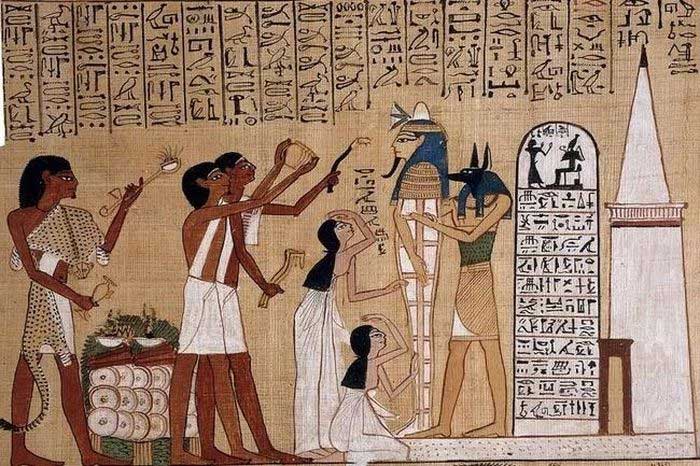Not only do myths offer enchanting folk tales that explain the creation and functioning of the world, but they also hold significant values regarding law and morality.
Apart from their vast system of hieroglyphs, the ancient Egyptians possessed a rich treasure of mythology that reflects a comprehensive view across various fields. Egyptian mythology is not just a work of folklore but also embodies the national pride of people from ancient times. Furthermore, it contains numerous values in terms of epic narratives, ethics, and law.
A Reflection of Social Life

An excerpt from the Egyptian Book of the Dead reflecting the beliefs of ancient Egyptians. (Photo: Commons/Wikipedia).
The ancient Egyptians had a very rich pantheon of deities. These gods often had familial ties, forming large clans with complex genealogies. The conflicts among members of this “divine family” were the sources of wars and diseases. This similarity between Egyptian and Greek mythology is quite significant.
The creation story is an essential part of mythology. For the ancient Egyptians, humans were created from the tears of the Sun God, Ra. Therefore, from birth to death, humans must undergo many tragic events that bring them to tears, allowing them to understand the suffering of Ra in creating humanity.
The ancient Egyptians did not overly deify the powers and benevolence of their gods. Myths clearly indicate that in his old age, Ra became forgetful and made many poor decisions, causing his descendants to fall into a vortex of power struggles. As a result, the world of the gods, like the lives of mortals, became chaotic.
The gods also exhibited many flaws such as selfishness, greed, jealousy, and pettiness. To seize power, some gods resorted to cunning methods; Set, the God of Storms, is a prime example. Set killed his brother Osiris to control the fertile lands along the banks of the Nile.
Set was originally the ruler of the underworld, while Osiris governed the fertile land symbolizing the world of the living. The conflict between these two gods reflects the ancient Egyptians’ understanding of imbalance in the natural world and social life. Evil and malice always wait for the opportunity to emerge and destroy the good.
The ancient Egyptians did not impose a perfect, flawless image on the deities they revered and worshiped. This notion is quite similar to the ancient Greeks’ view of their gods. To them, the deities are supreme beings, yet they are not without imperfections.
The Connection Between Mythology and Law
The ancient Egyptians established a well-organized and comprehensive legal system. The laws and penalties in ancient Egyptian society were very strict, ensuring justice so that the innocent would not be wronged and the guilty would receive appropriate punishment. These concepts of the importance of law enforcement are distinctly represented in mythology.
When Set murdered his brother and sought to usurp the throne of his nephew, Horus, a council of deities was convened to judge Set and protect Horus’s rights. As a result, Set dared not act recklessly. This detail demonstrates that the ancient Egyptians recognized the significance of the law in social life.
In the ancient world, Egypt was a nation where women held a relatively high status. Not only were women from noble or royal families valued, but even common women enjoyed many economic, legal, and social rights equal to those of men.
Egyptian women had the right to own property, inherit a portion of the couple’s assets, and make wills to leave their possessions to anyone. In the family, women were equal to their husbands, having the right to sue their husbands in court and divorce, especially in cases of mistreatment.
Thus, in the mythology of ancient Egypt, goddesses held very important positions. The goddess Isis, wife of Osiris, was willing to stand before the council of deities to argue for her son Horus’s inheritance rights. Her and her son’s rights were also protected by the council of gods.
The ancient Egyptians understood that the law acts as a shield, protecting the vulnerable from the claws of the wicked. On the other hand, the law itself serves as a divine force to restrain the evil within each person.
Egyptian mythology is not only a work of folklore but also contains many values related to history and culture. Through stories of deities, pharaohs, and heroes, readers can see the progressive and egalitarian thinking of people from the Nile in various aspects of life.


















































